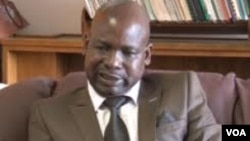Zimbabwe’s prosecutor general Johannes Tomana on Thursday issued the private certificates of prosecution in compliance with the judgement of the Constitutional Court that had given him 10 days to comply or risk a 30-day jail term.
Tomana had been found to be in contempt of the High Court and Supreme Court that had ruled that he should issue the certificates in three cases involving Zanu-PF Member of Parliament for Bikita West, Munyaradzi Kereke, accused of allegedly raping a minor and former Telecel Zimbabwe board member, Jane Mutasa.
Mutasa is accused of allegedly swindling the company more than US$1,7 million while Vivek Solanki faces charges of defrauding African Medical Investments in the Trauma Centre ownership wrangle.
National director of public prosecutions Florence Ziyambi issued the certificate on behalf of Tomana.
Charles Warara, a lawyer representing a then 11 year-old girl allegedly raped by Kereke at his Mt. Pleasant home in Harare, confirmed receiving the certificate which read in part:
“Whereas Munyaradzi Kereke was accused of rape as defined in section 65 and indecent assault as defined in section 67 of the Criminal Law (Codification Reform) Act chapter 09 (23) respectively and whereas a private party who can show some substantial and peculiar interest in the issue of the trial arising out of some injury which the individual has suffered by the commission of the offense may prosecute in any court competent to try the offense, the person alleged to have committed it.
“Now therefore I Florence Ziyambi a delegate of the Prosecutor General of the Republic of Zimbabwe having been authorized by him in terms of Section 6 of the Criminal Law (Codification Reform) Act do hereby certify on his behalf and instruction that the Prosecutor General has seen the statement or affidavit on which the charge is based and declined to prosecute at the public instance.”
The issuing of the certificates means Tomana has avoided going to jail as the prison term was suspended on condition that he complies with the court orders within 10 days.
Chief Justice Godfrey Chidyausiku ruled last week in a unanimous judgment made together with eight other judges of the Constitutional Court that “the applicant is committed to imprisonment for a period of 30 days, the whole of which is suspended on condition that the applicant complies with the (above) orders of the High Court and the Supreme Court by issuing the requisite certificates nolle prosequi within 10 days of this order.
“In the event the applicant fails to comply with this order, he shall be in his personal capacity barred from appearing as a legal practitioner in Zimbabwe.”
The ruling came after Tomana approached the Constitutional Court challenging recent judgments of the High Court and Supreme Court compelling him to issue certificates for the private prosecution of the three.
However, Chidyausiku shot down Tomana's arguments and accused him of abusing his powers to protect alleged law transgressors.
“This is an officer of the court who deliberately disobeys a court order. It’s not something that this court will take lightly. It is not desirable to give the Prosecutor General a blank cheque. A court order was disobeyed by a very senior government official who is supposed to uphold the law,” Chidyausiku said.
Efforts to get a comment from Tomana, Kereke and Mutasa were futile as they were not answering their mobile phones.
President Robert Mugabe's spokesman George Charamba on Monday backed the stance that Tomana had taken telling the state-controlled Herald newspapers that government is studying the Constitutional Court ruling compelling Tomana to issue certificates of private prosecution with a view to addressing contradictions in the constitution over the power and the rights it gives to individuals and state institutions.











